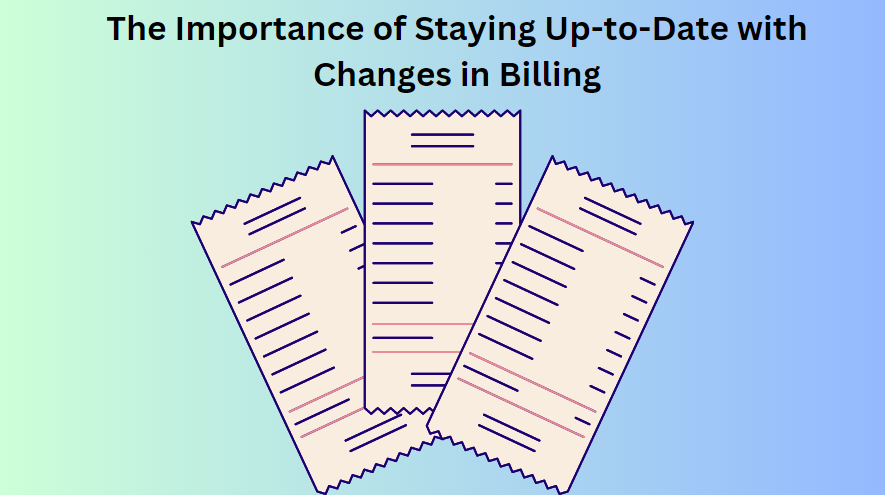Staying up-to-date with changes in medical billing and coding is not a choice in the ever-changing world of healthcare; it is a strategic need. This article discusses the necessity of staying up to date on the newest advances in this sector, as well as how they affect healthcare workers, institutions, and, ultimately, patient care.
Why Medical Billing and Coding Matter

The Backbone of Healthcare Finance
The financial backbone of the healthcare business is medical billing and coding. Accurate coding and billing not only guarantee that healthcare professionals are paid on time, but they also play an important role in the financial health of healthcare organizations.
Compliance and Legal Requirements
Keeping up with changes in medical billing and coding is essential for staying in compliance with ever-changing regulatory rules. Noncompliance can lead to financial penalties, ruined reputations, and legal consequences. Regular upgrades guarantee that healthcare firms comply with requirements such as HIPAA and the Affordable Care Act.
The Rapid Evolution of Medical Codes
Introduction of ICD-11
The recent switch from ICD-10 to ICD-11 has major implications for medical coding. Professionals must get familiar with the new codes and guidelines to correctly document diagnoses and treatments. Failure to adapt might result in claim denials and reimbursement delays.
CPT Code Modifications
Continuous updates in Current Procedural Terminology (CPT) codes also demand attention. Knowing the latest codes ensures accurate representation of medical services, preventing billing errors and reducing the risk of audits.
Technological Advancements in Healthcare

Implementation of Electronic Health Records (EHR)
The integration of EHR systems has revolutionized medical billing and coding. Professionals need to stay informed about the latest EHR functionalities to streamline coding processes, minimize errors, and enhance overall efficiency.
Artificial Intelligence in Coding
Artificial intelligence’s rise in medical coding provides both challenges and opportunities. Understanding how artificial intelligence affects coding processes is critical for maintaining accuracy and simplifying operations. Professionals must keep informed to reap the benefits of AI without risking data security.
Impact on Patient Care
Timely and Accurate Reimbursements
Proper coding has a direct impact on the financial health of healthcare providers. Reimbursements that are timely and correct allow organizations to invest in improved resources, technology, and training, eventually enhancing patient care.
Enhanced Data Accuracy
Correct coding results in exact medical records. This not only provides continuity of treatment but also promotes data-driven decision-making, which contributes to better patient outcomes.
The Continuous Learning Imperative Due to Changes in Medical Billing

Professional Development
Medical billing and coding professionals must prioritize continuous learning. Attending workshops, and webinars, and pursuing certifications ensures they remain abreast of industry changes, allowing them to apply the latest knowledge in their roles.
Institutional Training Programs
To keep their workforce up to date, healthcare institutions should engage in training programs. This proactive strategy not only reduces the chance of mistakes but also promotes a culture of continual improvement inside the organization.
Navigating Changes in Medical Billing and Coding
Increased Scrutiny and Audits
Audits have become more often as healthcare rules have become more complicated. Staying up to date on code changes is critical for withstanding audit scrutiny and ensuring that billing processes adhere to industry standards and laws.
Fraud Prevention and Detection
Regular updates in medical coding guidelines help in preventing and detecting fraudulent activities. Being aware of the latest coding requirements enables professionals to identify anomalies, reducing the risk of fraudulent claims and protecting the integrity of the healthcare system.
Adapting to Changing Payer Policies
Payer-Specific Coding Requirements
Different insurance providers often have unique coding requirements. Staying current with payer policies ensures that healthcare providers submit claims by specific guidelines, minimizing claim rejections and delays in reimbursement.
Value-Based Care Models
The shift towards value-based care models necessitates a reevaluation of coding practices. Professionals must understand how these models impact coding and billing, as reimbursement is increasingly tied to the quality and efficiency of care provided.
Final Thoughts
The search for knowledge is never-ending in a sector as dynamic as medical billing and coding. Adapting to changes is a proactive way to safeguard the financial health of healthcare facilities and, ultimately, the well-being of patients. Staying educated is an investment in the future of healthcare, where precision, efficiency, and compliance are critical success factors.

Recent Comments